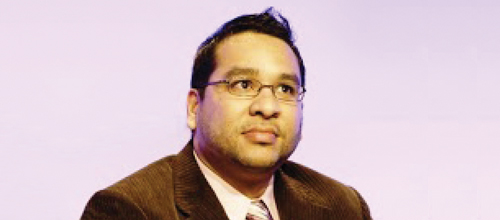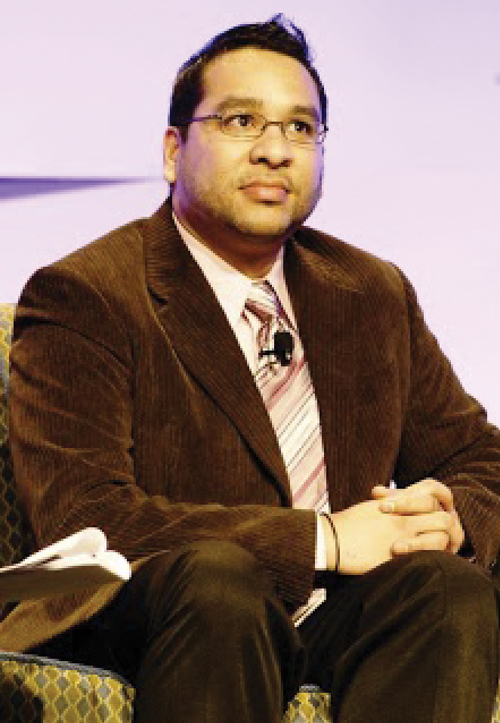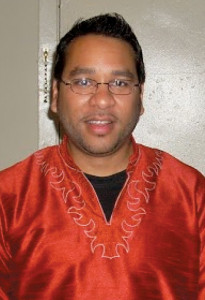
The Progressive Muslim Movement

Faisal Alam presents ‘Hidden Voices: Lives of LGBT Muslims.’
by Sadiq Ali Sheraze
“I wasn’t intending to start an organization,” says Faisal Alam, a queer-identified Muslim activist. “I struggled with trying to reconcile my sexuality with my faith. I didn’t know how that was going to happen. I thought I was the only one who was dealing with these issues.”
This was all before 1998 when, at the young age of nineteen, Alam used an international email Listserv to create Al-Fatiha, which was once one of the largest Muslim LGBT organizations in the nation.
Since then, Alam has been selected as an “Innovator” by Advocate magazine and has been recognized by Genre magazine as a “Founding Father.” He has received several awards and recognitions for his activism, and has been touring the country presenting his lecture “Hidden Voices: The Lives of LGBT Muslims.”
In this presentation, Alam shares LGBT stories (including his own) about growing up in Islam—stories that reveal some of the issues that LGBT Muslims face. Despite the criticism he has received, he has found a platform where he can speak about issues that, according to Alam, “most people do not often think about. People do not think about LGBT Muslims, and if they do, they think that people are being killed because of it, or that there is really no way to reconcile [their sexuality and their faith].”
Among the many Muslim organizations developing in the U.S., the Muslim Alliance for Sexual and Gender Diversity (MASGD) is one that Alam and several other organizers created this year. Many of these groups are working to debunk the myth that LGBT Muslims do not exist and that all Muslims are homophobic.
“We have really come a long way with the exposure [that LGBT Muslims] have received and the work we have done to make our presence known, both within the mainstream LGBT community and the mainstream Muslim community. That also has a lot to do with the progressive vision of Islam that many of us are pushing,” Alam says of the strides MASGD and similar organizations are making on behalf of LGBT Muslims globally.
Organizations such as MASGD and Muslims for Progressive Values, a similar group that promotes LGBT and women’s equality and other progressive causes, are all pushing to create an environment where Islam can be more inclusive and accepting on issues such as gender and sexuality. Alam believes that things are quickly changing for both the LGBT Muslim community and the mainstream Muslim population.
Alam explains this evolution in thinking: “The rhetoric was always ‘Our religion condemns homosexuality, there is no place for homosexuals within our faith, the Quran says that homosexuality is forbidden, and that is the end of the story.’ [But then the thing that really changed] the conversation we were having with mainstream Muslims was 9/11. September 11 really changed a lot of different things, because now mainstream Muslims [have much bigger issues than simply worrying] about what is going on with queer Muslims.”
“All of a sudden, American Muslims are dealing with Islamophobia and hate crimes and this real, visceral backlash that also affected LGBT Muslims in a different way,” he adds.
According to Alam, for many American LGBT Muslims, “Islamophobia is seemingly a bigger issue than homophobia, and much more visible to people in regards to our skin color and our names. The sexuality becomes secondary to people. Many more LGBT Muslims are taking on a political identity—being Muslim and asserting a cultural identity.”
Alam also believes the atmosphere is changing for LGBT Muslims because of congressmen such as Keith Ellison (D-Minnesota) and Andre Carson (D-Indiana). These men are the only two Muslims in Congress and, according to Alam, “Both of them are very supportive of LGBT issues.”
“They have also become bridge builders for bringing these issues to light.” Alam explains the similarities between the LGBT community and the larger Muslim community: “They are oftentimes facing the same struggles. They are both ostracized, and they are both viewed as minorities. The same religious figures and the same political figures [often speak out] against both communities.”
For many individuals, there is this seemingly vast difference in ideologies between the Muslim communities and the LGBT communities; however, regardless of the differences, there is a similar prejudice that both groups are facing in America today.
The progressive Muslim groups like MASGD, and individuals like Alam, are working diligently to reduce prejudices held by both Muslim and non-Muslim individuals.
Alam believes that Muslim youth are changing as well. “There is a second generation and now a third generation of Muslims that are growing up in the United States that have been exposed to issues of sexuality, and are much more open to conversations and dialogue around issues of gender and sexuality,” Alam adds.
God willing, these conversations will remain open and individuals like Alam will continue to make progress toward acceptance and tolerance.
What: Hidden Voices: Lives of LGBT Muslims
When: October 10
Where: University of Houston
Details: hiddenvoices.info.
Sadiq Sheraze is a Houston-based freelance writer.

_______________________________________________________
SIDEBAR
More on LGBT Muslims
Al-Fatiha, a Washington DC-based organization that advocates for the rights of LGBT Muslims, is just one of several such groups around the world.
Founder and former director Faisal Alam points out that most traditional scholars of Islam consider same-sex acts to be sinful, and many believe that having a gay or lesbian sexual orientation is unnatural. Yet he shares his story of faith and sexual identity around the world as a way of opening conversations about how Islam and homosexuality are not mutually exclusive.
With more than 1.5 billion followers, Islam is the second-largest religion in the world. An estimated six to eight million Americans call themselves Muslim, and Islam is the fastest-growing religion in the United States. It’s impossible to estimate how many of them are gay, lesbian, bisexual, or transgender.
Alam’s presentation “Hidden Voices: The Lives of LGBT Muslims” has been featured at more than 125 universities and colleges across the country since 2003. While highlighting the diversity of Islam around the world and in the United States, “Hidden Voices” explores the legacy of colonialism and sodomy laws within the Muslim world, and the suppression of LGBT rights around the world under the guise of the so-called war on terror.
Alam has been profiled in numerous national publications, has received many recognitions and awards for his activism on behalf of queer Muslims, one of thirty “Young Visionaries Under 30” by the Utne Reader. In 2005 the Equality Forum honored Alam as one of “40 Heroes” who have “made a defining difference in LGBT civil rights over the last forty years.”
In 2011 he was invited to the White House to attend President Obama’s annual White House Iftar Dinner, the traditional breaking of the fast at the end of Ramadan.
For more information, visit hiddenvoices.info. —Marene Gustin











Comments